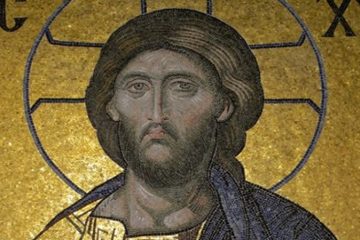Metropolitan Symeon of Nea Smyrni
As Christians, we’re always striving. The Christian life is a continual, ceaseless struggle. But the period of Great Lent, as a time of preparation for the celebration of Easter, the greatest feast, requires a more intense effort, more fervent zeal and a more methodical struggle.
What constitutes the spiritual struggle of this time, which we’re called upon to engage in? It’s defined clearly in the third hymn of the Triodio [Vespers on the Sunday of Forgiveness], by Saint Theodore the Studite: ‘Let us set out with joy upon the season of the fast, and prepare ourselves for spiritual combat. Let us purify our soul and cleanse our flesh; and as we fast from food, let us also abstain from every passion. Rejoicing in the virtues of the Spirit may we persevere with love, and so be allowed to see the solemn Passion of Christ our God, and with great spiritual gladness, to behold His holy Pascha’.
1. The first thing the hymnographer recommends is that we cleanse our soul. What is the soul? The inner person. Our spiritual persona. ‘The person hidden in the heart’, as Saint Peter writes (1 Peter 3, 4).
Saint Athanasios the Great writes: ‘The soul is an essence which is intellectual, bodiless, impassive and immortal’ (1). And Saint Makarios the Egyptian goes into even greater detail: ‘Just as the body consists of many parts but is considered one person, so there are many parts to the soul: intellect, conscience, will, and thoughts which condemn or defend. All of these are firmly bound together in a single outlook and are the parts of the soul. For the soul is one: the inner person’ (2).
When our soul ceases to act in accordance with its nature, as God created it to do, then it becomes sick. Sin is an illness of the soul. The passions are ‘diseases of the soul’ (3). They pollute it and make it unclean.
Saint Maximos the Confessor writes: ‘Impurity of the soul is caused when it does not act in accordance with its nature. This is why impassioned thoughts are born in it. It acts in accordance with its nature when its passive [roughly, ‘susceptible’ WJL] forces- meaning the incensive and appetitive- remain unaffected by any stimulus they receive from things and from thoughts’ (4).
How, then, can we cleanse our soul, free it from the dominion of the passions, maintain it so that it always acts in accordance with its nature?
The answer given by the holy Fathers is related to the tripartite division of the soul, which they all teach, without exception. The three parts of the soul are: the logical, the appetitive, and the incensive [very roughly, ‘thinking, wanting and acting’ WJL].
Saint Maximos again stresses: ‘Just as the body sins through things and has the bodily virtues to chastise it and bring it to its senses, so the nous, which sins through impassioned notions, has spiritual virtues for its chastisement, so that, seeing things clearly and without passion, it is prudent’(5).
What virtues shall we use to cleanse the powers of the soul? The logical: through reading, spiritual contemplation and prayer; the incensive: with love, which is opposed to hate; and the appetitive: through prudence and restraint. ‘Rein in the incensive part of the soul with love; wither the appetitive through restraint; and give wings to the logical through prayer’ (6).
Purification of the soul means release from the passions (7) and freedom from wicked thoughts. Saint Isaak the Syrian adds that this is achieved by observing God’s commandments (8).
We might mention here the view of another spiritual teacher: ‘Reading and prayer cleanse the nous; love and restraint purify the passive elements of the soul(9).
2. We’re not only souls, however. We also have a body. Body and soul together constitute our unified and indivisible being. Salvation isn’t a matter purely for the soul, but also concerns the body. We’re saved in our entirety, both body and soul. And we achieve our salvation through a struggle undertaken by body and soul together. The soul strives and the body strives along with it. So, if we’re to purify the soul, we must also cleanse the body. ‘Let us cleanse the flesh’, as Saint Theodore said above. Purification of the soul and cleansing of the body are inextricably bound. They go hand in hand. Saint Cyril of Jerusalem teaches: ‘The soul does not sin by itself, but through the body’ (10).
It follows that if we seek the purification of the soul we must also cleanse the body from the stain of sin, as Saint Maximos teaches: ‘Sin makes the body unclean through particular actions’ (11).
As we’ve seen, spiritual virtues contribute to the purification of the soul, and bodily virtues to the cleansing of the body. The chief virtue is fasting. And together with fasting, the Fathers recommend vigils, hymn-singing, prayer and a strict guard over the senses.
The spirit of the life in Christ is ascetic. A spiritual life without bodily hardship cannot exist. This mutual relationship is pointed out to us by Saint Symeon the New Theologian:
‘It is impossible to stuff the body to surfeit with food and, at the same time, to enjoy spiritually the noetic and divine goodness. The more we indulge our stomach, the more we deprive ourselves of this; while the more we discipline the body, the more it is commensurately filled with spiritual nourishment and consolation’ (12).
(to be continued)
1. To Antiochos 16.
2. Discourse 7, 8; PG 34, 528b.
3. Clement the Alexandrian, Exhortation 11.
4. Chapters on Love 3, 35, Philokalia vol. II.
5. Ibid 2, 64.
6. Ibid 4, 42, 80.
7. Thalassios 2, 79, Philokalia, vol. II.
8. Epistle 4: the Extant Ascetics. Cf. also Saint Thalassios: ‘Observation of the commandments gives birth to repentance; and observance of the commandments brings purity to the soul’ (2, 77, Philokalia, vol II).
9. Thalassios 2, 84, Philokalia vol II,
10. Catechesis 4, 23.
11. Chapters on love 3, 36, Philokalia vol. II.
12. Chapters 1, 42.
Source: pemptousia.com
ABOUT THE ORTHODOX CHRISTIAN NETWORK
Orthodox Christian Network (OCN) is a 501(c)3 and an official agency of the Assembly of Canonical Bishops of the United States of America . It is a recognized leader in the Orthodox Media field and has sustained consistent growth over twenty-two years. We have worked to create a community for both believers and non believers alike by sharing the timeless faith of Orthodoxy with the contemporary world through modern media. We are on a mission to inspire Orthodox Christians Worldwide. Click to signup to receive weekly newsletter.
Join us in our Media Ministry Missions! Help us bring the Orthodox Faith to the fingertips of Orthodox Christians worldwide! Your gift today will helps us produce and provide unlimited access to Orthodox faith-inspiring programming, services and community. Don’t wait. Share the Love of Orthodoxy Today!
OCN has partnered with Pemptousia. A Contemporary post-modern man does not understand what man is. Through its presence in the internet world, Pemptousia, with its spirit of respect for beauty that characterizes it, wishes to contribute to the presentation of a better meaning of life for man, to the search for the ontological dimension of man, and to the awareness of the unfathomable mystery of man who is always in Christ in the process of becoming, of man who is in the image of divine beauty. And the beauty of man springs from the beauty of the Triune God. In the end, “beauty will save the world”.




0 Comments